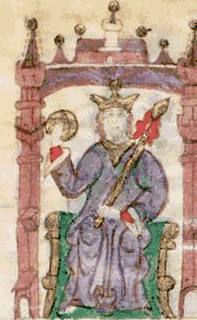Liuva I
Liuva I (died 570[1] 571-572[2] or 573[3]) was a Visigothic King of Hispania and Septimania.

He was made king at Narbonne following the death of Athanagild in 567. Roger Collins notes this was the first time a Visigothic king is mentioned in the north-eastern region of the realm since 531, when Amalaric was murdered. He suggests Liuva's coronation near the border with the Franks was because of renewed threats from that neighbor; under Guntram, the Franks are known to have posed more of a threat to the Visigoths.[4] This threat would also explain why in the second year of his reign, Liuva made his brother Liuvigild both co-ruler and heir, putting him in direct charge of Hispania Citerior, or the eastern part of Hispania.[5]
The Frankish threat may also explain why Liuva gave shelter to bishop Pronimius (modern French: Fronime). Gregory of Tours states Pronimius had left Bourges to live in Septimania "for some reason or other". Liuva made him bishop of Agde, an office he held into Liuvigild's reign. When that monarch attempted to assassinate him, Pronimius then fled back to Gaul, and eventually made his way to the court of the Frankish king Childebert, who then appointed Pronimius bishop of Vence.[6]
Liuva died in the third year of his rule from unrecorded causes.[7]
References
- Walsh, P. G. (June 1967). "1. The Ruodlieb: The first medieval epic of chivalry from eleventh-century Germany. Translated by Gordon B. Ford. Pp. 104. Leiden: Brill, 1965. Paper, fl. 14. - 2. Isidore of Seville: History of the Goths, Vandals, and Suevi. Translated by Guido Donini and Gordon B. Ford. Pp. viii+46. Leiden: Brill, 1966. Paper, fl. 12". The Classical Review. 17 (2): 235–235. doi:10.1017/s0009840x00324520. ISSN 0009-840X.
- Dates of death according to Peter Heather, The Goths (Oxford: Blackwell, 1996), p. 279; however Isidore of Seville states Liuva died in 570 (Historia de regibus Gothorum, Vandalorum et Suevorum, chapter 48; translation in Guido Donini and Gordon B. Ford, Isidore of Seville's History of the Goths, Vandals, and Suevi, second revised edition [Leiden: E.J. Brill, 1970], pp. 22f)
- of Biclaro, Johannes (590). "Chronicon (Iohannes Biclarensis) - Wikisource". la.wikisource.org. Retrieved 2020-01-24.
- Collins, Early Medieval Spain: Unity in Diversity 400-1000, second edition (New York: St. Martins, 1995), p. 40
- John of Biclaro, Chronicle, 10. Translated in Kenneth Baxter Wolf, Conquerors and Chroniclers of Early Medieval Spain, second edition (Liverpool: University Press, 1990), p. 60
- Decem Libri Historiarum, IX.24; translated by Lewis Thorpe, History of the Franks (Harmondsworth: Penguin, 1974), pp. 511f
- Peter Heather, The Goths (Oxford: Blackwell, 1996), p. 279; Isidore of Seville, chapter 48; translation by Donini and Ford, pp. 22f
| Regnal titles | ||
|---|---|---|
| Preceded by Athanagild |
King of the Visigoths 567–572 with Liuvigild |
Succeeded by Liuvigild |